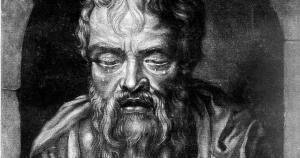 Wrong ideas can be helpful. . . Sometimes. Nobody ought to wish to be wrong, but being wrong is not sinful. If you are learning symbolic logic, making an error in moving from one line to the next is not a sin unless when shown the problem you refuse to address the issue and learn.
Wrong ideas can be helpful. . . Sometimes. Nobody ought to wish to be wrong, but being wrong is not sinful. If you are learning symbolic logic, making an error in moving from one line to the next is not a sin unless when shown the problem you refuse to address the issue and learn.
Learning, growing, being human is full of wrong turns, bad ideas, and mistakes.
If you are studying the cosmos today, the following explanation for planets, the sun, and other stars will not help you:
224 He does not reveal the nature of the surrounding; it contains, however, bowls turned with their hollow side towards us, in which the bright exhalations are collected and form flames, which are the heavenly bodies. Brightest and hottest is the flame of the sun…. And sun and moon are eclipsed when the bowls turn upwards; and the monthly phases of the moon occur as its bowl is gradually turned.*
No.
Really no.
But so said Heraclitus: the wisest man to live in Ephesus until Saint John moved there. Saint Basil recommends we begin our studies learning from the noble pagans, particularly in terms of virtue. Says the Saint: “Since the life to come is to be attained through virtue, chief attention must be paid to those passages in which virtue is praised. . . .”
Heraclitus looked at the heavens and tried to explain what was happening. He appears to have thought that the earth, in his geometric cosmos, emitted fire. Perhaps, he had volcanoes or steam vents in mind. The planets, stars, moon, and sun were bowl shaped and collected these bright exhalations, accumulated them, and formed flames. These flames were hotter than the the fire they collected, being concentrated, the hottest being the sun. Heraclitus could explain an eclipse by the turning of the bowls away from the earth. This is entirely wrong. The earth is not the center of the cosmos and the moon, sun, stars, and planets are not bowls. Eclipses are not caused by the turning of the sun or moon.
Yet if you are doing contemporary cosmology, you owe these wrong ideas a debt. Heraclitus gave his readers a theory about how natural phenomena worked. His theory was wrong, but showing how it was wrong helped knowledge to progress. Because Heraclitus explained natural phenomena naturally, he was a forerunner to the scientific revolution. Just as vitally, Heraclitus explained personal phenomena with persons.
When we come to human consciousness or to the actions of intelligence, Heraclitus saw a “Logos” (a God) that permeated the cosmos. The very word “cosmos” came from an ordered rank of troops. There were events that did not require the immediate intervention of God, humans, or any other persons (like gods!), but there were other events that did show intelligent agency. His hometown of Ephesus was not the result of natural agency (like his cosmology), but logos (mind/word). The cosmos was fundamentally, because ordered, a product of Mind, though that Mind intelligently allowed material processes to unfold. Heraclitus thought there were four elements (water, earth, air, fire) and that God worked through fire.
He was wrong in the details of his theory, but as a forerunner to Christianity, correct in seeing the cosmos as dualistic. The cosmos changes, that is (generally) the result of materials interacting with each other without the direct result of mind (the light from the sun, eclipses). The plan that set up this system is the product of Mind! In a smaller way (a microcosmic view), the city of Ephesus was a product of logos/mind that also had to deal with the changes that came from matter interacting with matter.
Heraclitus had a cosmos that allowed for change, material causation, and intelligent causation. He could look at a room and understand that the fire in the fireplace was causing the heat and explain that heat naturally, but also see the form or pattern of the fireplace and existence of the fire in that very room as the product of intelligence.
Heraclitus got the details wrong, that matters, but he set humankind up for a conversation that could correct the details. He did not reduce the cosmos to fire (his favored element) or ignore the material while looking to the God-Logos. Instead, Heraclitus postulated Mind steering the elements. Mind/God was not a science stopper, explaining too much, and matter was not a humanity denier, explaining away our souls.
Thank God for Heraclitus, an intellectual John the Baptist for better thinkers like Saint John.
—————————————————
Heraclitus, Presocratic Philosophers Kirk, Raven, Schofield.












